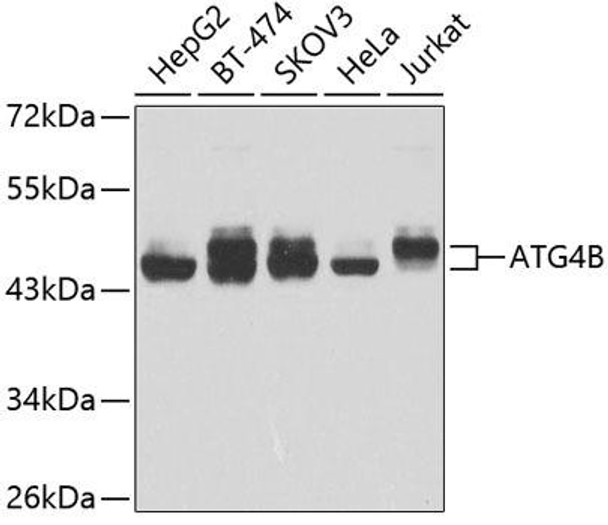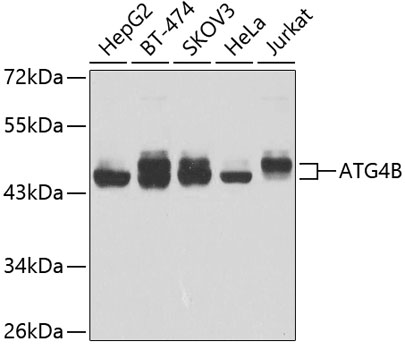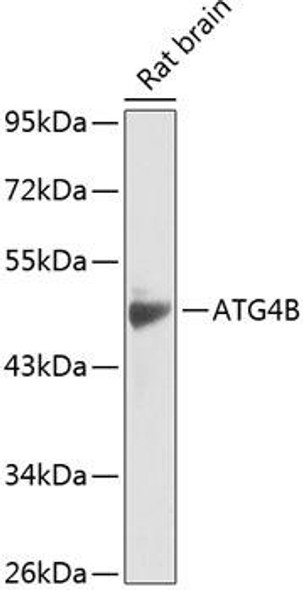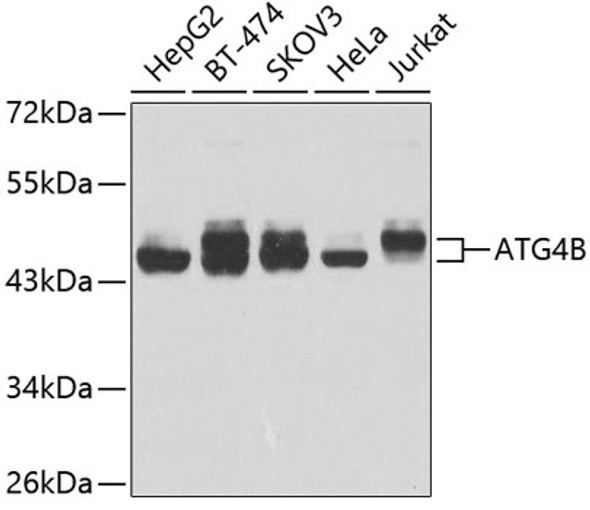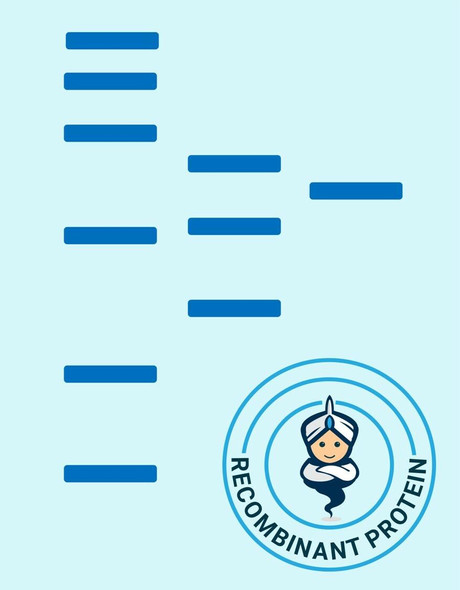Autophagy Antibodies
Anti-ATG4B Antibody (CAB2837)
- SKU:
- CAB2837
- Product Type:
- Antibody
- Reactivity:
- Human
- Host Species:
- Rabbit
- Isotype:
- IgG
- Research Area:
- Autophagy
Description
| Antibody Name: | Anti-ATG4B Antibody |
| Antibody SKU: | CAB2837 |
| Antibody Size: | 20uL, 50uL, 100uL |
| Application: | WB |
| Reactivity: | Human |
| Host Species: | Rabbit |
| Immunogen: | Recombinant fusion protein containing a sequence corresponding to amino acids 1-393 of human ATG4B (NP_037457.3). |
| Application: | WB |
| Recommended Dilution: | WB 1:500 - 1:2000 |
| Reactivity: | Human |
| Positive Samples: | HepG2, BT-474, SKOV3, HeLa, Jurkat |
| Immunogen: | Recombinant fusion protein containing a sequence corresponding to amino acids 1-393 of human ATG4B (NP_037457.3). |
| Purification Method: | Affinity purification |
| Storage Buffer: | Store at -20'C. Avoid freeze / thaw cycles. Buffer: PBS with 0.02% sodium azide, 50% glycerol, pH7.3. |
| Isotype: | IgG |
| Sequence: | MDAA TLTY DTLR FAEF EDFP ETSE PVWI LGRK YSIF TEKD EILS DVAS RLWF TYRK NFPA IGGT GPTS DTGW GCML RCGQ MIFA QALV CRHL GRDW RWTQ RKRQ PDSY FSVL NAFI DRKD SYYS IHQI AQMG VGEG KSIG QWYG PNTV AQVL KKLA VFDT WSSL AVHI AMDN TVVM EEIR RLCR TSVP CAGA TAFP ADSD RHCN GFPA GAEV TNRP SPWR PLVL LIPL RLGL TDIN EAYV ETLK HCFM MPQS LGVI GGKP NSAH YFIG YVGE ELIY LDPH TTQP AVEP TDGC FIPD ESFH CQHP PCRM SIAE LDPS IAVG FFCK TEDD FNDW CQQV KKLS LLGG ALPM FELV ELQP SHLA CPDV LNLS LDSS DVER LERF FDSE DEDF EILS L |
| Gene ID: | 23192 |
| Uniprot: | Q9Y4P1 |
| Cellular Location: | Cytoplasm |
| Calculated MW: | 31kDa/37kDa/42kDa/44kDa/52kDa |
| Observed MW: | 44kDa |
| Synonyms: | ATG4B, APG4B, AUTL1 |
| Background: | Autophagy is the process by which endogenous proteins and damaged organelles are destroyed intracellularly. Autophagy is postulated to be essential for cell homeostasis and cell remodeling during differentiation, metamorphosis, non-apoptotic cell death, and aging. Reduced levels of autophagy have been described in some malignant tumors, and a role for autophagy in controlling the unregulated cell growth linked to cancer has been proposed. This gene encodes a member of the autophagin protein family. The encoded protein is also designated as a member of the C-54 family of cysteine proteases. Alternate transcriptional splice variants, encoding different isoforms, have been characterized. |
| UniProt Protein Function: | ATG4B: Cysteine protease required for autophagy, which cleaves the C-terminal part of either MAP1LC3, GABARAPL2 or GABARAP, allowing the liberation of form I. A subpopulation of form I is subsequently converted to a smaller form (form II). Form II, with a revealed C-terminal glycine, is considered to be the phosphatidylethanolamine (PE)-conjugated form, and has the capacity for the binding to autophagosomes. Mainly expressed in the skeletal muscle, followed by brain, heart, liver and pancreas. Inhibited by N-ethylmaleimide. Belongs to the peptidase C54 family. 5 isoforms of the human protein are produced by alternative splicing. |
| UniProt Protein Details: | Protein type:EC 3.4.22.-; Autophagy; Protease; Ubiquitin conjugating system Chromosomal Location of Human Ortholog: 2q37.3 Cellular Component: cytoplasm; cytosol Molecular Function:cysteine-type endopeptidase activity; cysteine-type peptidase activity; endopeptidase activity; protein binding Biological Process: autophagic vacuole formation; autophagy; C-terminal protein lipidation; macroautophagy; mitochondrion degradation; protein delipidation; protein processing; protein targeting to membrane; proteolysis |
| NCBI Summary: | Autophagy is the process by which endogenous proteins and damaged organelles are destroyed intracellularly. Autophagy is postulated to be essential for cell homeostasis and cell remodeling during differentiation, metamorphosis, non-apoptotic cell death, and aging. Reduced levels of autophagy have been described in some malignant tumors, and a role for autophagy in controlling the unregulated cell growth linked to cancer has been proposed. This gene encodes a member of the autophagin protein family. The encoded protein is also designated as a member of the C-54 family of cysteine proteases. Alternate transcriptional splice variants, encoding different isoforms, have been characterized. [provided by RefSeq, Jul 2008] |
| UniProt Code: | Q9Y4P1 |
| NCBI GenInfo Identifier: | 296434400 |
| NCBI Gene ID: | 23192 |
| NCBI Accession: | Q9Y4P1.2 |
| UniProt Secondary Accession: | Q9Y4P1,Q53NU4, Q6ZUV8, Q8WYM9, Q96K07, Q96K96, Q96SZ1 Q9Y2F2, B7WNK2, |
| UniProt Related Accession: | Q9Y4P1 |
| Molecular Weight: | 42,622 Da |
| NCBI Full Name: | Cysteine protease ATG4B |
| NCBI Synonym Full Names: | autophagy related 4B cysteine peptidase |
| NCBI Official Symbol: | ATG4B |
| NCBI Official Synonym Symbols: | APG4B; AUTL1 |
| NCBI Protein Information: | cysteine protease ATG4B |
| UniProt Protein Name: | Cysteine protease ATG4B |
| UniProt Synonym Protein Names: | AUT-like 1 cysteine endopeptidase; Autophagin-1; Autophagy-related cysteine endopeptidase 1; Autophagy-related protein 4 homolog B; hAPG4B |
| Protein Family: | Cysteine protease |
| UniProt Gene Name: | ATG4B |
| UniProt Entry Name: | ATG4B_HUMAN |
View AllClose

